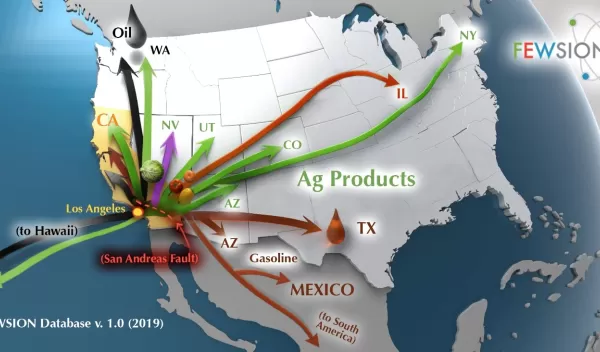
Data scientists map the supply chains of every U.S. city
No matter where you live in the United States, some food in your kitchen probably started its life in California's agricultural fields.
How do you know? Vegetables, like every other product, follow a supply chain that moves them from where they're grown to where they're consumed. That supply chain can be tracked through data, and those data paint a picture of how food, water and energy move throughout the United States. The result shows that every corner of America is connected.
FEWSION is a data fusion project developed by scientist Ben Ruddell of Northern Arizona University and colleagues. The project maps the food, energy and water supply chains for every community in the United States.
The data were collected by hundreds of researchers at federal agencies and universities throughout the country, and, for the first time, have been placed into a searchable and visual form for anyone to use.
The maps are available on the FEW-View website, enabling Gulf Coast residents to see how much their gas prices could be affected by a hurricane, or how much New Englanders should worry about water shortages.
With FEWSION, people can map the sources of their community's grains, meat and other foodstuffs; crude oil, gasoline, natural gas and electricity; and water sources.
"This is a new way to see big data, to see your supply chains, to see your connections,” Ruddell said. “We look at exposure. If you have a lot of exposure in your supply chain, there is a strong potential for you to be affected by a drought, storm or a decision far away.”
The information is useful for those who want to buy more local products or measure the sustainability of a community's food and energy consumption.
Ruddell sees FEWSION as especially useful for emergency managers, who can plan ahead if a disaster in another part of the country is likely to affect their community, and for sustainability officers who want to reduce their community's footprint by changing commodity sourcing and supply chains.
"We all depend on food, energy and water," says Amy Walton, a program director in NSF's Office of Advanced Cyberinfrastructure, which funds FEWSION. "Now, though FEWSION, we can see how what one community does affects its neighbor communities, and how a community affects an entire ecosystem."
